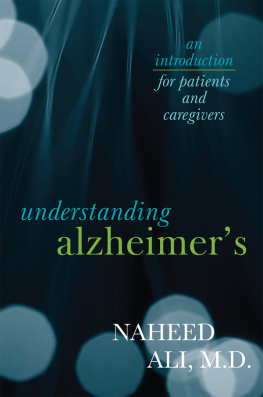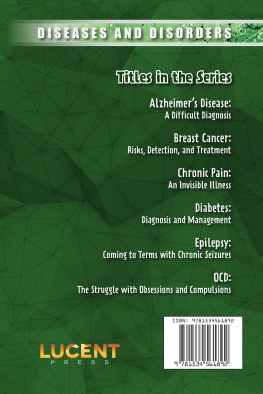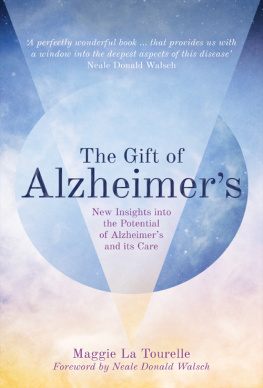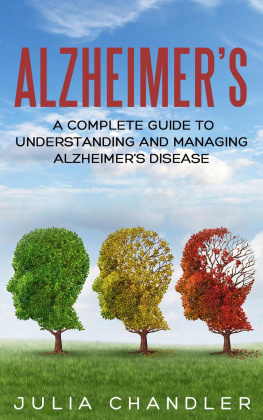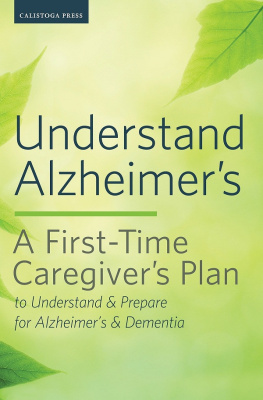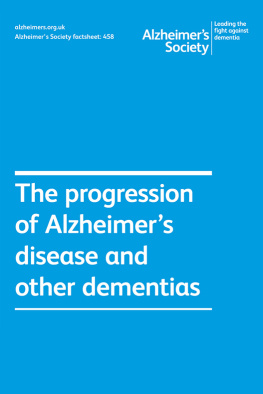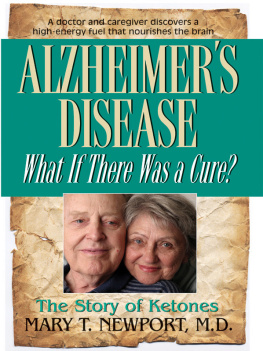ALZHEIMERS DISEASE, MEDIA REPRESENTATIONS AND THE POLITICS OF EUTHANASIA
Alzheimers Disease, Media Representations and the Politics of Euthanasia
Constructing Risk and Selling Death in an Ageing Society
MEGAN-JANE JOHNSTONE
Deakin University, Australia
First published 2013 by Ashgate Publishing
Published 2016 by Routledge
2 Park Square, Milton Park, Abingdon, Oxon OX14 4RN
711 Third Avenue, New York, NY 10017, USA
Routledge is an imprint of the Taylor & Francis Group, an informa business
Copyright Megan-Jane Johnstone 2013
Megan-Jane Johnstone has asserted her right under the Copyright, Designs and Patents Act, 1988, to be identified as the author of this work.
All rights reserved. No part of this book may be reprinted or reproduced or utilised in any form or by any electronic, mechanical, or other means, now known or hereafter invented, including photocopying and recording, or in any information storage or retrieval system, without permission in writing from the publishers.
Notice:
Product or corporate names may be trademarks or registered trademarks, and are used only for identification and explanation without intent to infringe.
British Library Cataloguing in Publication Data
Johnstone, Megan-Jane.
Alzheimers disease, media representations and the politics of euthanasia : constructing risk and selling death in an ageing society.
1. Alzheimers disease--Public opinion. 2. Euthanasia--Public opinion. 3. Mass media and public opinion. 4. Alzheimers disease--Patients--Care. 5. Euthanasia--Law and legislation.
I. Title
362.1'96831-dc23
Library of Congress Cataloging-in-Publication Data
Johnstone, Megan-Jane.
Alzheimers disease, media representations, and the politics of euthanasia : constructing risk and selling death in an ageing society / by Megan-Jane Johnstone.
pages ; cm
Includes bibliographical references and index.
ISBN 978-1-4094-5192-1 (hardback) -- ISBN 978-1-4094-5193-8 (ebook)
1. Alzheimers disease--Patients--Palliative treatment--Moral and ethical aspects. 2. Medical ethics. 3. Health in mass media. I. Title.
RC523.J643 2013
179.7--dc23
2012034192
ISBN 9781409451921 (hbk)
ISBN 9781315566634 (ebk)
Contents
List of Figures
List of Tables and Boxes
Tables
Boxes
Foreword
A tell-tale indication of any significant work is that it focuses on a topic that in large measure has not previously been covered, the thoughtful consideration of which can do significant good for humankind. Megan-Jane Johnstone has written just such a book, and for this reason we are indebted to her. She succeeds admirably in unveiling the ways in which a highly activist international campaign for the legalization of physician-assisted suicide and euthanasia (direct killing by lethal injection or pills) both of which can be clearly contrasted with the widely accepted practices of refusal or withdrawal of treatment has attached itself opportunistically to the cause of people with dementia, and in the process has popularized an unbalanced and torturous portrait of the experience of the deeply forgetful. This portrait, while politically convenient to the pro-euthanasia activists, is also deeply dehumanizing and diminishes our openness to the needs of these vulnerable individuals.
This process of dehumanization is occurring in the context of what Professor Johnstone refers to as the Alzheimerization of the euthanasia debate in western Europe, with such voices as that of the philosopher Dame Mary Warnock joining the chorus of supporters. The reader will learn the latest information on the escalation of pre-emptive suicide and euthanasia of the deeply forgetful in the Netherlands. The author brings us up to date on a change in the position of Alzheimers Australia, which while previously neutral on the question of assisted suicide and euthanasia, released a paper in 2011 (Planning for End of Life for People with Dementia) in which these practices are listed as options that may become legally available sometime in the future. While this does not constitute an endorsement, it raises none of the ethical ambiguities and mixed consequences related to such practices that one would expect to see articulated by an advocacy group. Media attention is now heavily drawn to the activist cause, and this impacts public opinion polls, law reports, homepages, and opinion leaders without actually engaging the debate at a deeper level. Indeed, much of the progress made with regard to hospice care and quality of life for the deeply forgetful is simply ignored, dismissed as irrelevant, or even attacked as pointless. Many activists merge their appeals for suicide and euthanasia with statements about how this silver avalanche of the deeply forgetful will devastate national economies. Johnstone provides a refreshing exposure of the factual one-sidedness of this activist movement as she presents a factually balanced analysis of Alzheimers disease in its progression, epidemiology, and direct and indirect costs than one finds among the death activists.
The third chapter of this book is the best discussion yet available on metaphors, analogy, and the stigmatization or even demonization of the deeply forgetful. This chapter, entitled Media Representation, Metaphors, and the Stigmatization of Alzheimers Disease, highlights the preponderance of negative metaphor that colour the experience of dementia. These include loss of mind, of personal control, of dignity, of selfhood, and the like. Of course there is loss of mental capacity and self-control, but selfhood is retained to degrees, and dignity is never lost. Alzheimers is portrayed as the worst of all diseases, the saddest of tragedies, the mark of doom, and the living death. The person with dementia is already dead, gone, and absent. The half-truths and negative metaphors are coming not from those engaged in the constructive care of the deeply forgetful, but from spectators (reporters, scholars, philosophers, activists, and relatives). Professor Johnstone identifies two major negative impacts of this metaphorical imaging:
1. the undermined understanding of Alzheimers disease and the care options available to people living with the disease, and a related loss of the idea of dementia as a manageable disease;
2. a reinforced stigmatization and shame-attachment that attaches to this vulnerable constituency, leading to nonperson status and loss of moral membership, and to a consequent limiting of obligations to and options for these individuals, along with the exculpation of active killing.
Professor Johnstone calls for a new language and new metaphors that will enable the constructive representation of the complex issues associated with the increasing prevalence of Alzheimers disease and the need for appropriate resources to be provided to ensure and enable that those diagnosed with the disease are properly cared for from diagnosis to death. I agree with Professor Johnstone, and offer the metaphor of the deeply forgetful as a starting point. After all, we are all a little forgetful, and some of us very much so, but we are still individuals who can experience life positively and are worthy of being treated with respect and dignity.
The fourth chapter of this well-structured book is entitled



